.gif) This week started in lively fashion, with all eyes on the appearance of Facebook founder Mark Zuckerberg in the European Parliament. Having resolved a very public squabble about whether the hearing should be live streamed to European citizens, rather than held behind closed doors, the conference of Presidents (leaders of the European Parliament’s political groupings) proceeded to squander their opportunity to extract meaningful answers from the Silicon Valley supremo.
This week started in lively fashion, with all eyes on the appearance of Facebook founder Mark Zuckerberg in the European Parliament. Having resolved a very public squabble about whether the hearing should be live streamed to European citizens, rather than held behind closed doors, the conference of Presidents (leaders of the European Parliament’s political groupings) proceeded to squander their opportunity to extract meaningful answers from the Silicon Valley supremo.
While better briefed than their Congressional counterparts, the format of the exchange — lengthy interventions and meandering questions from several MEPs in one go, followed by Zuckerberg giving a combined answer — was not conducive to a forensic analysis of Facebook’s data collection policies or dominant market power. The meeting ended abruptly, with Zuckerberg forced to promise written answers to questions he was not able to answer in the allotted time (subsequently delivered). The Facebook founder emerged with his reputation intact, while the European Parliament came out diminished, appearing overly bureaucratic and stilted when presented with a real opportunity to deliver for EU citizens.
On Wednesday the limelight fell on Budget Commissioner Gunther Oettinger, who presented the Commission’s proposal for the 2019 budget to Parliament. Undented by Brexit (the UK has agreed to continue payments up until at least 2020 as part of the transition agreement) the budget actually amounts to a 3% increase on 2018, totalling €166 billion in commitments to boost the European economy. No small amount of this will be directed towards investment in digital infrastructure, including €12.5 billion (+8.4% over 2018) for research and innovation under Horizon 2020, €194 million for a new European High-Performance Computing Joint Undertaking and €3.8 billion under the Connecting Europe Facility.
Brexit negotiations juddered back into life this week, having recently slowed thanks to the impasse over the Northern Irish border issue. UK negotiators are keen to avoid the dynamic of earlier rounds of talks, where lack of preparation has allowed the Commission negotiating team to set the agenda. This time, British negotiators delivered a detailed presentation on Wednesday, outlining the mutual benefit in reaching a swift agreement on data flows. In return for committing to uphold equivalent data protection standards after Brexit, the UK is seeking an adequacy agreement to guarantee uninterrupted data flows and an ongoing role for the UK’s data protection authority, the ICO.
The UK’s data protection love-in coincides neatly with the entry into force of the General Data Protection Regulation, enforceable across the EU as of today (25 May). EU policy-makers will trumpet this as a significant achievement in protecting EU citizen’s fundamental rights and putting in place the foundations of the Digital Single Market — but critics will be watching closely for disruption to businesses dependant on the processing of personal information.
Looking ahead to next week, business ministers will be in town on Monday and Tuesday for the Competitiveness Council, with a packed agenda featuring an update on EU Space Policy and the recently published Platform to Business Regulation. Depending on the outcome of the COREPER meeting on Friday 25 May, ministers could also rubber stamp a political agreement on the Copyright Directive, paving the way for trilogue talks, although early indications are that consensus among member states on this tricky file could prove elusive.












